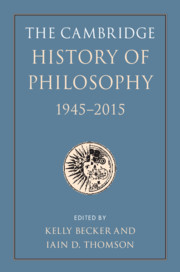Book contents
- The Cambridge History of Philosophy, 1945–2015
- The Cambridge History of Philosophy, 1945–2015
- Copyright page
- Contents
- Contributors
- Preface and Acknowledgments
- Introduction
- Part I Analytic Philosophy
- Section One Language, Mind, Epistemology
- 1 Analytic Philosophy of Language
- 2 Analyticity
- 3 Philosophy of Linguistics
- 4 Varieties of Externalism, Linguistic and Mental
- 5 An Analytic-Hermeneutic History of Consciousness
- 6 Computational Philosophies of Mind
- 7 Philosophy of Action
- 8 Contemporary Responses to Radical Skepticism
- 9 Post-Gettier Epistemology
- Section Two Logic, Metaphysics, Science
- Section Three Analytic Moral, Social, and Political Philosophy
- Section Four Analytic Aesthetics and Philosophy of Religion
- Part II Continental Philosophy
- Part III Bridge Builders, Border Crossers, Synthesizers, and Comparative Philosophy
- Part IV Epilogue: On the Philosophy of the History of Philosophy
- References
- Index
2 - Analyticity
The Carnap–Quine Debate and Its Aftermath
from Section One - Language, Mind, Epistemology
Published online by Cambridge University Press: 08 November 2019
- The Cambridge History of Philosophy, 1945–2015
- The Cambridge History of Philosophy, 1945–2015
- Copyright page
- Contents
- Contributors
- Preface and Acknowledgments
- Introduction
- Part I Analytic Philosophy
- Section One Language, Mind, Epistemology
- 1 Analytic Philosophy of Language
- 2 Analyticity
- 3 Philosophy of Linguistics
- 4 Varieties of Externalism, Linguistic and Mental
- 5 An Analytic-Hermeneutic History of Consciousness
- 6 Computational Philosophies of Mind
- 7 Philosophy of Action
- 8 Contemporary Responses to Radical Skepticism
- 9 Post-Gettier Epistemology
- Section Two Logic, Metaphysics, Science
- Section Three Analytic Moral, Social, and Political Philosophy
- Section Four Analytic Aesthetics and Philosophy of Religion
- Part II Continental Philosophy
- Part III Bridge Builders, Border Crossers, Synthesizers, and Comparative Philosophy
- Part IV Epilogue: On the Philosophy of the History of Philosophy
- References
- Index
Summary
W. V. Quine’s criticisms of Rudolf Carnap’s efforts to draw a boundary between analytic and synthetic sentences shook mid-twentieth-century Anglo-American philosophy to its foundations, leaving logical empiricism in ruins and sparking the development of radically new ways of theorizing that continue to shape philosophy today. Despite decades of discussion, however, neither Carnap’s analytic–synthetic distinction nor Quine’s criticisms of it are well understood. My central goals here are to summarize and clarify them, evaluate influential objections to Quine’s criticisms, survey related work on analyticity and apriority by Hilary Putnam, Saul Kripke, David Chalmers, Paul Boghossian, and Gillian Russell, among others, and briefly discuss whether meaning is determinate in ways that recent explications of analyticity require.
- Type
- Chapter
- Information
- The Cambridge History of Philosophy, 1945–2015 , pp. 32 - 48Publisher: Cambridge University PressPrint publication year: 2019

